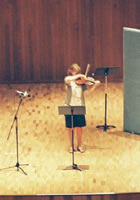|
7am
There's only one drawback to the morning swim across the bay
on a superb Autumn morning: how can the day go up from here?
Well, on the bike at least, things go definitely up between
Coogee Beach and the University of New South Wales.
And
the adrenalin level goes up at 9am. I have only one class today,
but a big one: first year physics for physicists, electrical
engineers and computer scientists: a good group. One of them
(why only one?) has solved the puzzle: we had calculated the
point where the Earth's and sun's gravitational fields are equal
but opposite. It is closer to the Earth than is the moon. A
puzzle! If the moon falls into the sun, I had said, they are
all responsible. A digression holds an interesting lesson about
the web: one student had sought the answer on the site of a
planetarium, but it has the moon's orbit wrong. Andrew, however,
is right, and has resolved the paradox.
After
writing to the planetarium, I do some work on an outreach
project that a colleague and I are preparing for the centenary
of relativity in June. (Part of it is up at www.phys.unsw.edu.au/~jw/time.html) More
outreach: a journalist who works for the Faculty of Science
calls to talk about a story. Much research passes unnoticed
by the media, but perhaps this story, about the effects
of playing or not playing violins over extended periods,
will attract a quirky but widespread readership. The scientific
paper will appear at the end of April, so he will send a
press release for 2 May.
A
biological researcher in Canberra has an interesting question
about cavitation in plants at sub-zero temperatures. I spend
some time thinking about that and replying with a lateral thinking
hypothesis with which I'm quite pleased. Something interesting
might grow out of this idea. Then a reference for a recent PhD
student, aiming for a better job.
A
12:30 meeting with a materials scientist working in industry
who had read my web site on the physics of sailing. He has ideas
for producing a new sail system, and wants to talk about it.
How does this fit into my job? Well, a university has three
main roles: it creates understanding (by research), it transmits
understanding (by teaching) and it is a repository of understanding
for the benefit of the community. So in the last role I have
made this appointment. His ideas are interesting and I hope
he ends up with a product.
After
lunch, several tasks. Talking briefly to a PhD student about
experiments that he is doing today. Assess an exam written by
a colleague (is it fair, is it appropriate level?). Finding
and setting up gear for an experiment that I am going to do
next week.
I
spend an hour or so on theory. In this problem, there is a simple
linear effect and a less simple nonlinear effect, which are
additive. But the calculations are ten times smaller than what
we measure. We (the lab team) have been thinking about this
for several weeks, on and off, since first we did the calculations.
On one hand it's frustrating. On the other, it's fun: there's
room to do the 'creation of understanding' I mentioned above.
Today I tried a new idea. It didn't help, at least not yet.
Bother. I haven't done much real research today and I haven't
made much progress. But the occasional success, the thrill of
being the first to see something or the first to understand
it, that is why I chose this career.
A
3pm meeting about a teaching project goes well.
Then
work on a paper describing a project on which six of us have
worked. We are writing three large and moderately technical
papers to describe it. But we are also making a short simple
account for a generalist journal. I sent a first draft of this
to the team a couple of days ago. I collect their comments and
suggestions to make a new version, and redraw the figures in
a simpler way.
From
work I go to see Michael Frayn's play "Democracy",
about Willy Brandt. Bob Hawke is in the next row, which
is interesting for two reasons. First the parallels: Hawke
and Brandt are social democrats, each succeeded a series
of conservative regimes that had been first established
by nondemocratic means, and both had strong personal followings.
The other reason is that it's the second time I've seen
Mr Hawke this week. On Tuesday, I went to the graduation
of a student, part of the team for the paper I mentioned
above. Bob Hawke was at the ceremony for the same reason.
In all the time we knew him, the student in question had
never mentioned that his mentor was the former prime minister.

A
member of the expert panel plays a violin blindfold. This
picture was taken during last year, part of the long term
violin study mentioned in the diary.
|